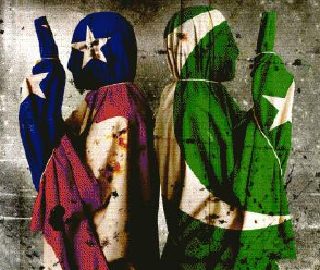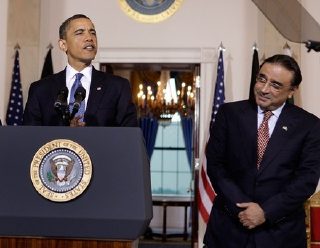 Since 9/11 government of Pakistan has received roughly ten billion dollars from the USA in military and civilian aid. Half of this amount was as rent reimbursement for the use of Pakistani military facilities by the USA for her Afghanistan war efforts while the rest was as direct economic aid to Pakistan.
Since 9/11 government of Pakistan has received roughly ten billion dollars from the USA in military and civilian aid. Half of this amount was as rent reimbursement for the use of Pakistani military facilities by the USA for her Afghanistan war efforts while the rest was as direct economic aid to Pakistan.
Bush administration had no strings attached to the funds and Government of Pakistan was free to spend the money as it deemed fit. As a result of this economic aid combined with lifting of other economic sanctions by the US, Pakistan government under President Musharraf was able to retire some of its debts, revive its economy and at the same time built up its foreign reserves. But that was mostly during the years when both the White House and the American Congress were under the Republican control.
In year 2006 midterm elections the political fortunes of President Bush and the Republican party declined. The Democratic Party which historically has been less sympathetic to Pakistan sought to change the terms and nature of American aid to Pakistan. Vice President Joe Biden, then Chairman of Senate Foreign Relations Committee, in cooperation with Republican Senator Richard Lugar introduced a bipartisan bill called ‘Enhanced Partnership with Pakistan Act of 2008.’ After the 2008 elections, when Biden left the Senate, the mantle was picked up by the incoming new Chairman, Senator John Kerry, another stalwart of the Democratic party. The bill, numbered S. 3263 offers Pakistan one and half billion dollars annually for the next five years in economic aid. Only this time with strong strings attached.
The bill, in bureaucratic jargon referred as ‘non-security assistance to Pakistan’, contains two very important clauses. One that:
“Funds would be used for projects that promote democratic governance and private sector growth, and for education, construction of physical infrastructures, and other programs intended to benefit the people of Pakistanâ€.
In other words, the funds could only be used for the ‘projects’ that government of the United States of America considers will directly benefit civil life of the common man and in the process hopefully will lure him or her away from the current feelings of anti-Americanism and religious extremism. It is another component of American ‘war on terror’ designed to win the hearts and minds of Pakistani masses. As an extra measure the American administration will be required to prepare annual reports that such ‘projects’ are being implemented as intended. The total amount of 7.5 billion dollars even though appropriated in equal annual installments over the five year period between 2009 and 2013 will be outlaid on a graduated scale stretched over ten years ending in year 2018.
 The second important clause, which may not set very well with Pakistan military, has even tighter strings on Pakistan government. It reads that American Secretary of State Hillary Clinton must:
The second important clause, which may not set very well with Pakistan military, has even tighter strings on Pakistan government. It reads that American Secretary of State Hillary Clinton must:
“certify that the Pakistani Security Forces are not materially interfering in their country’s judicial or political processes and, they are making concerted efforts to prevent terrorists from operating in Pakistan or using it as a sanctuaryâ€.
This puts a burden on Pakistan military that it not only stays out of the politics but it must also perform to the satisfaction of the USA even though it itself has no direct gains from the aid package. How far Pakistan military brass will go along with this condition has yet to be seen.
![]()
The clause also states that:
“If the Secretary of State does not certify that the Security Forces of Pakistan have met certain security standards by year 2012, then the bill would prohibit the necessary licenses and programs for American private entities to export major defense equipment to Pakistanâ€.
According to the American Defense Security Cooperation Agency and defense industry experts, the value of American major defense equipment exported to Pakistan varies from few hundred millions to billions of dollars per year. Any such military equipment embargo would not only seriously hamper Pakistan’s defense readiness it could also cost millions in profit to the American defense contractors. For example if the embargo was placed in year 2008 the loss of profit to American private defense sector for that year would have been 136 million dollars. Under American laws in case of such embargo on Pakistan the USA government would be legally bound to reimburse that loss to the American firms. But what about the set back that Pakistan and its armed forces could suffer because of yet another American embargo against Pakistan. Who will reimburse that loss?
In the cold war era United States and Pakistan used to have a strategic alliance in the form of SEATO and CENTO. After the 1965 Pakistan-India war the realities of these now defunct treaties were exposed but the ‘strategic’ relations between the two countries continued, be at much lower level. For America there was still that ‘big bad bear’ in the north that must be confronted and Pakistan was a strategically located ally in that effort. The 1979 Soviet invasion of Afghanistan allowed USA and Pakistan to enter yet into another ‘client-service’ relationship. Even though both parties knew upfront the temporary nature of the relationship, Pakistanis acted with surprise when US switched sides after the demise of the Soviet Union and set up a new strategic alliance with India.
In the post-Soviet era America had very little usefulness of its old ally, Pakistan. But the 9/11 events changed the South-Central Asian equation one more time. The old American State Department and Pentagon Pakistan manuals were dusted off one more time. In 2001 Pakistanis entered with the USA into another ‘client-service’ relationship one more time. Only that the latest package of ‘Enhanced Relationship’ comes with much more tighter enhanced strings, the consequences of which must be fully understood.
Before accepting these funds Pakistan must revisit the history of its bilateral relationship with the USA. But the sad irony is that Pakistani ruling elites will take the money regardless, one more time.



















































I agree that if they are giving money they have a right to say that it is used properly. That is like saying that you take loan from a bank but don’t want the bank to inspect your house before you do!
@Adnan Siddiqi
What about Nawaz Sharif ? The tax-chor and loan defaulter.
Interesting to note that none of the comments posted here were brave enough to answer S Hapasand’s questions. We talk about self respect and beat the drum of nationalism but elect people like Zardari and parties like PPP to power. We bicker amongst ourselves over who’s Punjabi, who’s Taliban, why the American’s want our military to stay away from politics and do it’s ‘job’, while we demand American tax payers dollars but we will not rise against the corrupt within to rid our country of these lowest forms of humanity or do anything collectively that’s right for our society.